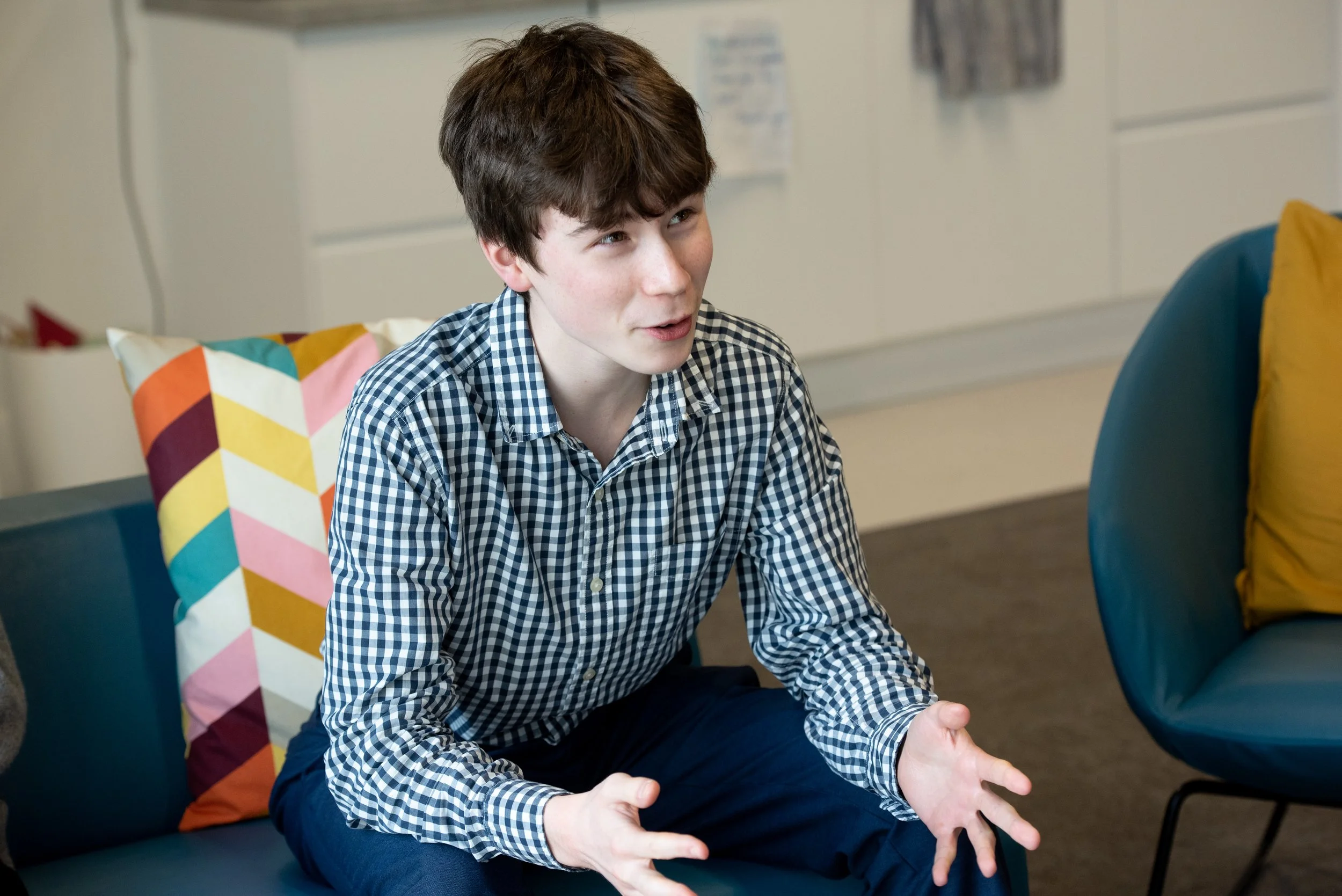
“As far as possible, leaders design personalised pathways for pupils, especially at A level, through subject choices which match pupils’ aptitudes and interests.”
ISI, April 2025
Sixth form academic
At Thames there is a strategic focus on subjects that open doors to a range of degree choices and other options.
We recognise that students will take different pathways post 18 and prepare them accordingly. Some students will apply to foundation courses or degree apprenticeships while others may choose the more traditional university route or to go straight into the workplace. Subject combinations are highly flexible and as far as possible are tailored to the aspirations of each individual student. Tutorial sized classes are taught by highly skilled subject specialists with extensive experience of teaching A level. Many bring industry experience and expertise into the classroom.
Our 2025 leavers achieved 39% of A level grades at A*/A and 85% at A*/C and destinations included Exeter, Bath, Cardiff, Swansea, Manchester, Sheffield, Surrey, Essex, Kingston, Nottingham Trent and Goldsmiths along with City & Guilds Art School. Courses included Architecture, Engineering, Product Design, Biomedical Sciences, Accounting & Finance, Psychology, Public Health and Human Geography.
Art and 3D Design were particularly strong with 90% of grades at A*/A and a number of students receiving unconditional university offers. The crossover between Maths, Physics and 3D Design has been a highly successful combination.
More details can be found here.
Students benefit from a brand new state of the art learning environment which includes: science laboratories designed for A Levels, a theatre with top of the range sound and lighting, design and STEAM workshops equipped with laser cutter, 3D printing, pressure former and mechanical and hand tools and art studios with a kiln. Students have exclusive use of a sixth form common room, independent study centre and seminar rooms.
Sixth form students at Thames sit three or four A Levels alongside full involvement in the wider activities offered. Subject specific trips enrich the A Level programme, making the most of the resources that London has to offer.
To study a subject at A Level, students should have a grade 7 at GCSE in their chosen subjects as well as good passes in at least six subjects including English and Maths.
Subjects are subject to minimum numbers and will reflect the range of interests of each cohort of students. This means that not all subjects will run in a given year.
-
The Art and Design A Level course develops students’ understanding of the value of art and design as well as their own skills and creativity.
The Fine Art strand is ideal for students who want to extend their artistic skills. Students develop their ideas and investigate the work of other artists, craftspeople and designers. There are five hours of teaching time per week: four practical, one reflective. Students also spend time during study periods refining their practice in the Sixth Form art room. The syllabus is enhanced by gallery and museum trips and visiting artists.
-
Biology A Level increases students’ knowledge and understanding of the study of living organisms and factors that may affect them. While developing their technical and practical skills, the course is designed to help students understand how decisions are made regarding scientific issues, and how the sciences contribute to the success of society as a whole. The Biology laboratory has been designed with A Levels in mind.
Biology A Level gives students career options including medicine, psychology, marine biology, biomedical science, sports science, nature conservation, pharmacology, environmental science and soil science.
-
Chemistry A Level enhances students’ knowledge and understanding of the properties of matter and how atoms, molecules and compounds interact to form the endless diversity of substances that make up our world. While developing their technical and practical skills, the course is designed to help students understand how decisions are made regarding scientific issues, and how the sciences contribute to the success of society as a whole. The Chemistry laboratory has been designed with A Levels in mind.
A Level Chemistry is a requirement for almost all university courses in medicine and veterinary science and many other science-related and STEM subjects.
-
A genuine interest in theatre is required for this course, and performance skills and acting ability are of paramount importance, as is willingness to participate on a practical level. A good standard of written and spoken English is also required and it is anticipated that students will have taken GCSE Drama. Independent study includes the expectation that students will rehearse in their own time. Students will benefit from the new theatre which is equipped with professional sound and lighting.
The analytical skills, as well as the creativity and confidence taught within this course, are welcomed at higher education level. Those considering a career in the arts, especially in directing, performing or designing are advised to take A Level Drama and Theatre Studies.
-
Economics A Level gives a strong grounding in both micro- and macro-economics, and applies both to the modern world, making it topical and engaging. It helps students develop the skills, knowledge and understanding that will enable them to think and reason as economists. No prior learning or knowledge of economics is required for taking A Level Economics. Economics combines the benefits of both science and arts courses, with students having to write extensively as well as utilising their numeracy skills. Economics provides a good grounding for later life and can lead to careers in finance, banking, stock broking, law, politics and journalism.
-
The study of English Literature at A Level encourages students to be inspired, motivated and challenged by reading widely across a range of texts and developing their independent study skills. By A Level, students are cultivating their own critical responses and engaging with the richness of literature. They will develop the valuable transferable skills of sustained research and composition.
-
The Extended Project Qualification is worth 50% of an A Level but goes beyond A Level in terms of the research and skills involved and is a good preparation for university. It is recommended for students who are thriving in their three A Levels as it is a challenging step up.
The Extended Project will develop and extend from one or more of the student’s study areas and/or from an area of personal interest or activity outside their main programme of study. To complete the EPQ requires in total 120 hours project work in which a student can pursue their own line of enquiry and interest, having agreed their project with their supervisor.
-
The focus is on how French-speaking society has been shaped, socially and culturally, how it continues to change, and aspects of the political landscape in a French-speaking country. Students will develop their knowledge and understanding of themes relating to the culture and society of countries where French is spoken, and their language skills. The syllabus focuses on three areas: social issues and trends, political and artistic culture, and literary texts and films.
-
Geography is a subject that links to many others such as economics, history and sociology, or biology, chemistry and maths. A student with a curiosity about the world around them - the patterns they see and the reasons for them, as well as the relationship between environment and society - is almost bound to do well. Geography students are in high demand in all areas of employment because of their training in data analysis and critical thinking. Geography provides an excellent skill basis for the majority of university degrees.
-
A Level History provides an ideal curriculum for students to ignite and engage their passions and interests. They will develop critical and reflective thinking, which they demonstrate in an essay exploring a topic of their own choosing, creating independent learners, critical thinkers and decision-makers. History is a highly respected academic subject that can be a springboard for a variety of courses at university and a diverse range of jobs including the law, administration, journalism, business, teaching and many others.
The A Level course covers the periods of the French Revolution and Napoleon, Britain, 1930-1997 and Civil Rights in the USA.
-
Textiles at A Level has a dedicated well-equipped studio space. Students gain an insight into the fashion industry and develop design skills and practical techniques in a variety of media including surface pattern design, silk screen, dyeing, embroidery, beading and appliqué. Students also explore fashion industry practices, ethical fashion, up-cycling, fashion branding and promotion. Work produced is always exciting, creative and innovative, reflecting each student’s personality and uniqueness in a wonderful way.
-
Students develop a wide range of skills and techniques that are highly valued at university and in the workplace. They learn how to reason logically, generalise mathematically and begin the art of constructing mathematical proofs. The syllabus requires students to apply their mathematical skills to solve real-world problems and enables them to draw conclusions using mathematical reasoning. Students will be encouraged to use technology such as graphical calculators and graphing software to help enhance their understanding. The Maths course is divided into three main components: pure mathematics, and two applied mathematics topics which are statistics and mechanics. Further Maths is an essential prerequisite for Maths degrees and is a preferred subject for some engineering courses.
-
The Music specification is designed to allow students to pursue their own musical interests. Students develop skills in the three distinct but related disciplines of performing, composing and appraising, whilst having flexibility to specialise in either performing or composing. Students may choose to apportion 10% of their assessment to either performing or composing as an in-depth study.
-
Physics A Level enhances students’ knowledge and understanding of the nature, and properties, of matter and energy. While developing their technical and practical skills, the course is designed to help students understand how decisions are made regarding scientific issues, and how the sciences contribute to the success of society as a whole. Physics and Engineering are popular degree subjects and Physics graduates are sought by oil and energy companies, transport companies, science communication roles and as Physics teachers.
-
Psychology offers a unique educational experience that develops a distinctive and broad set of skills. It is located in scientific method and allows scope for extensive evaluation from a range of perspectives. Skills developed include being able to communicate effectively using appropriate language, to interpret and critically assess scientific data, and to research and critically evaluate a range of sources. The acquisition of such a diverse range of skills will be of great benefit to students in further education, the workplace and society in general.
-
IThe syllabus focuses on how Spanish-speaking society has been shaped socially and culturally and how it continues to change. The syllabus fosters a range of transferable skills including communication, critical thinking, research skills and creativity, which are valuable to the individual and society.tem description
-
Design and Technology is taught through study of Three-Dimensional Design A Level. This is an exciting and creative course that helps facilitate varied careers in design and the wider visual arts, from architecture and interior design, to industrial design, furniture making, sculpture, product design or work within the film industry. Students hear from visiting designers who present their work and also take part in related trips.






